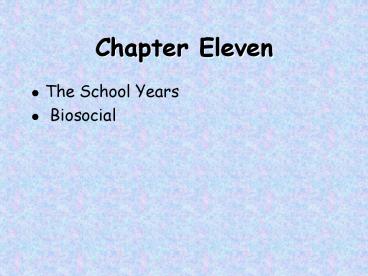Chapter Eleven - PowerPoint PPT Presentation
1 / 25
Title:
Chapter Eleven
Description:
ADHDA= ADHD children prone to aggression. Oppositional Disorder. Conduct Disorder. Help for children with ADHD. Drugs drugs with reverse affect ... – PowerPoint PPT presentation
Number of Views:47
Avg rating:3.0/5.0
Title: Chapter Eleven
1
Chapter Eleven
- The School Years
- Biosocial
2
Size and Shape
- Variations in Physiques
- Malnutrition, genetic factors, maturation
- Physical development affect friendships which are
partially based on physical appearance and
competence
3
- Childhood Obesity
- Obesity 20 overweight for height
- 10 of American children qualify
- Physical and medical problem
- Help for overweight children
4
- Causes of Obesity
- Heredity
- Activity level
- Quantity of food eaten
- Types of food eaten
- Attitude toward food
- Overfeeding in infancy and late childhood
- Television viewing
5
- Repeated dieting
- Precipitating event
- Physiological problems
6
- Variations in Health
- Individual variations
- Children aware, health differentiations can cause
problems - Requirement of school performance can point out
noted impediments
7
(No Transcript)
8
Skill Development
- Motor Skills
- Rapid growth rate leads to more skill at
controlling their bodies - Brain maturation is a key factor ?? reaction time
- Older child has better reaction time than younger
child
9
- Gender
- Boys and girls in physical abilities during
these years - Boys have advantage in sports like baseball
- Girls have advantage in sports like gymnastics
10
- Culture
- 3 hrs./wk PE in France and Switzerland
- 1 1/2 hr./wk PE in US
- 1 hr/wk in England or Ireland
11
- Genetic and Individual and age differences come
into play - Height
- Upper body strength
- Coordination of body movements
12
- Intellectual Skills
- Achievement measures how much learned in a
specific area - Aptitude measures potential accomplishment
- IQ test aptitude test to measure intelligence
13
- Problems with IQ tests
- does not consider rate of development, culture,
family, school, genes - difficult to measure potential without
achievement
14
(No Transcript)
15
Children with Special Needs
- Defined child who requires particular
accommodations in order to learn - physical, social or intellectual
16
- Developmental Psychopathology normal
developmental knowledge applied to study and
treatment of psychological disorders - Abnormality is normal
- Disability Changes over time
- Adulthood can be better or worse
- Diagnosis depends on social context
17
- Autism
- inability to relate in ordinary ways to other
people - Asperger syndrome highly functional autistic
- good communication, poor social perceptions
- Deficiencies appear in
- communication ability
- social skills
- imaginative play
18
- In later childhood may lack
- theory of mind
- emotional regulation
19
Learning Disabilities
- Defined as a failing that is attributable to a
specific physical handicap or lack of basic
education - Dyslexia ? reading disability
- Dyscalcula ? great difficulty with math
20
- Causes
- Prenatal factors ? teratogens exposure to
toxins - Genetic inheritance
- Learning-disabled child needs to be identified
and given help
21
(No Transcript)
22
- Attention-Deficit Hyperactivity Disorder
- ADHD Attention-Deficit Hyperactivity Disorder
- Lack of concentration is accompanied by
excitability, impulsivity, need to be active - Easily frustrated and quick-tempered
23
- Related Problems
- ADD great difficulty in concentrating for more
that a few moments at a time - ADHDA ADHD children prone to aggression
- Oppositional Disorder
- Conduct Disorder
24
- Help for children with ADHD
- Drugs ? drugs with reverse affect
- Psychological therapy ? help child and families
cope with problem - Structure of classroom
- Too rigid or too loose a structure harmful
- Structure with flexibility helpful
25
- Conclusion
- All special needs children can benefit from early
diagnosis and schooling techniques - Children can avoid other problems and become a
normally functioning adult































